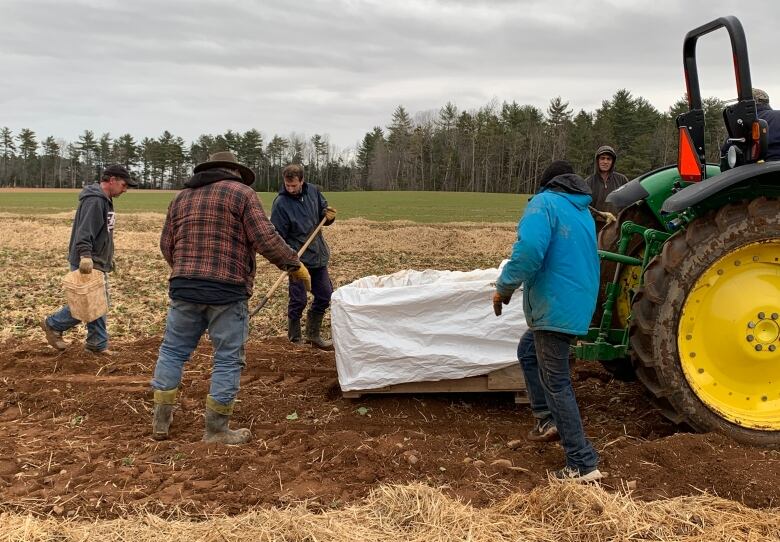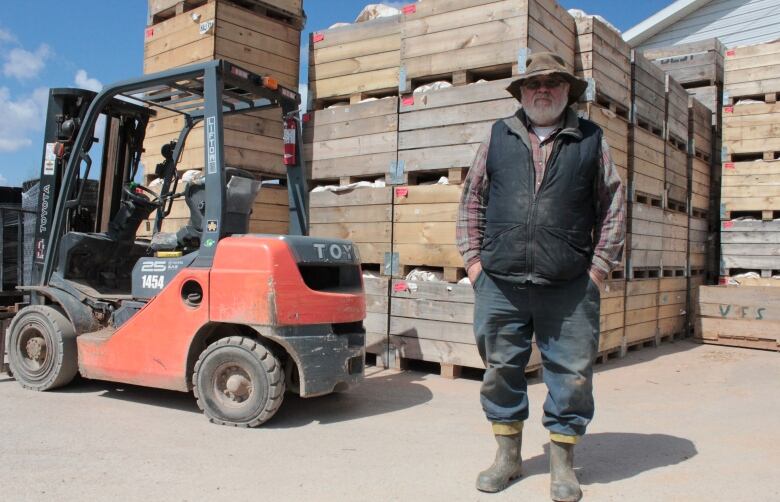Jamaican farmers start working in Annapolis Valley after quarantine
'We wouldn't be in business without temporary foreign workers,' says farmer

After two weeks cooped up inside at TapRoot Farms in Port Williams, N.S., Anthony Ellin was eager to get to work this week.
Ellin is one of a dozen Jamaican temporary foreign workers who arrived at the Annapolis Valley farm in mid-April. They spent the mandatory two weeks in quarantine.
"It wasn't bad. I made up my mind and said, 'I have to do what I have to do,'" he said Friday.
He and his coworkers all emerged with no signs of COVID-19 and started working Thursday. Ellin said he's farmed in Nova Scotia for a few years and was happy to be back, despite the pandemic.
"I like it here and the people that I work with show me love. Love is everything. It don't make sense to be somewhere and there's no love. These people show me love and respect," he said.
Ellin said Canadian dollars pack a lot of buying power in Jamaica and he sends most of his earnings home to support his wife and their three teenagers. "We just have to be safe, do what we're supposed to do, and stay away from this virus," he said.

Every year,the Canadian agricultural industry employs about 60,000 temporary foreign workers. When Canada closed its border on March 21 to non-essential travel, it initially included suchworkers. They were subsequently granted an exemption, but had to quarantine following their arrival.
Josh Oulton operates TapRoot Farms and spent much of the last two weeks shopping for the farmers and checking on their health. Everyone emerged with no signs of the virus, he said Friday.
He said they've got a physical-distancing system set up that should keep everyone apart and they're spacing trips to town out like everyone else. "We're trying our best," Oulton said.
The early spring meant they could have started a few weeks ago, but he said they're in good shape now.
Over at Charles Keddy Farms in Lakeville, N.S., 14 Jamaican farmers have also safely served their mandatory quarantineand started work planting and harvesting strawberries, raspberries, blackberries, asparagus, rhubarb and sweet potato. They also sell nursery stock.
"During that two-week period, we went and brought in the groceries they required so they didn't leave the property," Charles Keddy said Friday.

The temporary foreign workers are living in two bunk houses, rather than sharing one as usual, so that everyone can live and work with physical distancing.
"We wouldn't be in business without temporary foreign workers," Keddy said.
He's about a month behind because of the pandemic restrictions.
"It's a hard job to catch up when you get behind, particularly on an early spring growing season that we have right now, but we're transplanting as fast as we can and we're shipping orders all over North America. We're behind, but we hope to gradually catch up," he said.
The Jamaican farmers are mostly staying on the farm, he said. Usually, they head into town on a Friday night to meet up with their compatriots. That won't happen until the lockdown eases.
"They know it's the 'new normal' condition of not being able to leave the bunkhouse. They're just glad to be here and glad to be able to earn some wages to support their families," Keddy said.
"They just want to earn some money so they can send it home to their families. Without these temporary foreign workers, food would be much more expensive, and therewould be a much smaller selection of horticultural products on the supermarket shelves in Canada."












_(720p).jpg)


 OFFICIAL HD MUSIC VIDEO.jpg)
.jpg)



























































































